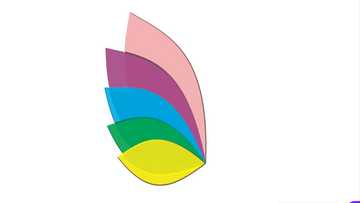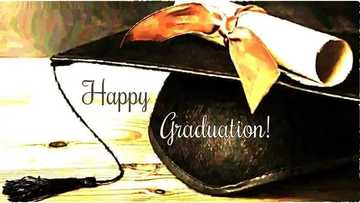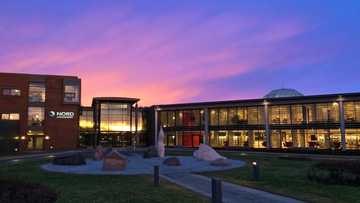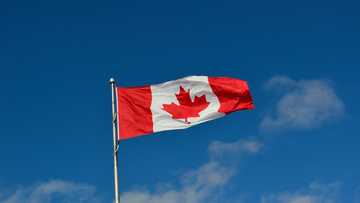Ghana Armed Forces recruitment questions
Being recruited to the armed forces is something most people dream of. It nevertheless is not a walk in the park. A lot is tested in order to ascertain that you are fit for the job. Physical fitness as well as intelligence is vital in this career. For instance, the Ghana armed forces recruitment questions may comprise the history of the country. The history of the country may entail colonization, it’s impacts, the major problems facing the country, the constitutional role of the Ghana armed forces among others. Therefore it is wise to be knowledgeable on this. Some of the Ghana armed forces recruitment questions are listed below and their answers too given.
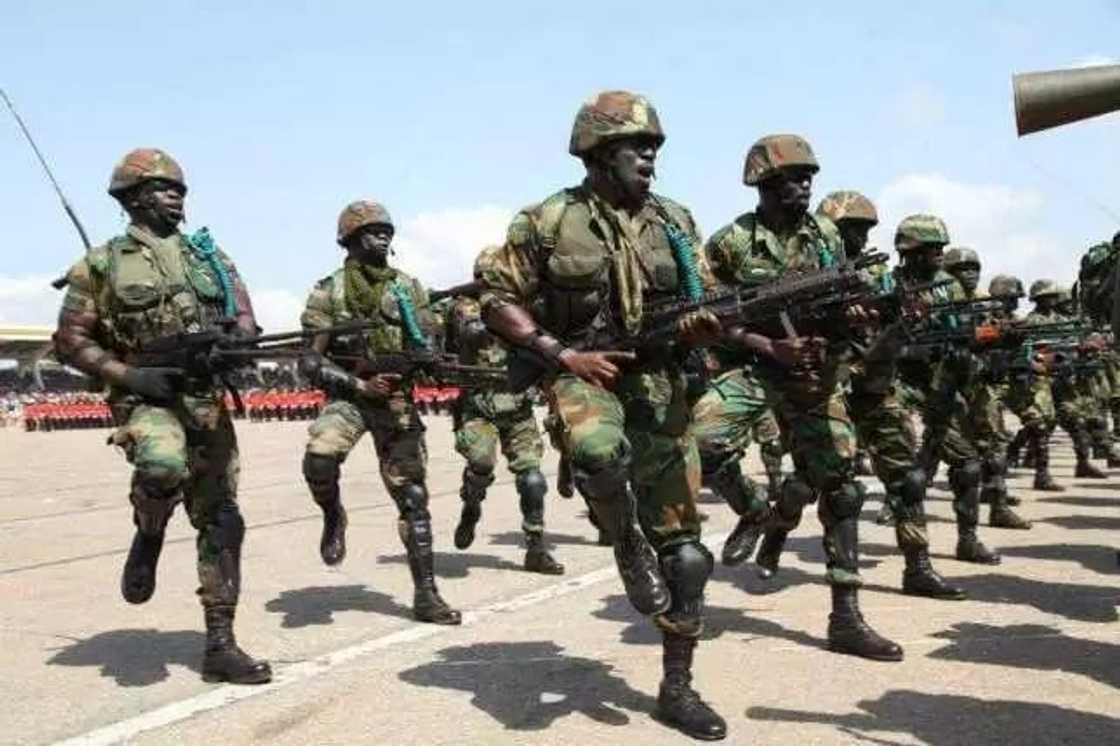
The security of any country is important to its existence, Ghana is no different. When picking the man power to offer these services, physical strength is not only the main issue of consideration but also mental strength. Any Ghanaian interested in joining the armed forces needs to prepare themselves well for this process. Our simple guide gives you tips on how to prepare yourself and the probable questions you will be asked in the interview.
How to prepare yourself for the Ghana armed forces recruitment process
The general standard of any recruitment process is that you need to first pass a set of interviews before landing the job. The Ghana armed forces recruitment process is no different. If you have previously been to an interview by now you know how important preparing yourself for this process is. Below are some of the things you need to keep in mind.
Do your homework on the probable interview questions
The more you know about an organization the better your chances of securing a spot. Therefore when preparing yourself for an interview with the Ghana armed forces it is important that you research and come up with a list of probable questions you will be asked. Look at the different functions of the army, their missions, functions and objectives as this will help you prepare better.

How you present yourself for the interview may add a little credit. First impressions matter so much in cases where you are meeting the interviewers for the first time. For these cases, it is advisable that you turn up for the interview on time. Your dress code is also a plus during interviews. Courtesy is also key. A simple hand shake can add a mark.
READ ALSO:Ghana army ranks and their symbols
Getting the answers right during an interview does not guarantee that you will be hired. How the answers are presented also matters. During an interview, it is key that you give the interviewer time to ask the questions to completion before giving answers. When giving your answers, you should ensure that you are audible enough. Confidence too is tested during an interview. In cases where a question is asked and you’re not sure about what answers to give, it is advisable that you give information related to the questions asked.
The recruitment questions are divided into three parts; the documentation part, body selection part and the aptitude test. The documentation part majorly entails checking ones credentials such as birth certificates, identity cards and education certificates. Education certificates include Basic Education certificate Examination (BECE), West African Senior Certificate Examination (WASCE). Other higher education certificates are presented as well. Forged documents found at this stage render the applicant recruitment terminated. Successful applicants proceed to the second stage of Ghana armed forces recruitment process.
The second part of the Ghana armed forces recruitment questions is the body selection part. In this part, the candidates are screened to ensure that they meet the physical requirements needed to join the Ghana armed forces. For the Ghana armed forces, the required height is 1.68m for females and 1.70m for males. Existence of tattoos is also checked. Candidates should not have any tattoos. For female candidates, presence of double piercings is checked. Double piercings are not allowed. Successful candidates are qualified for the third stage of the recruitment process.
The third part is the Ghana army aptitude test which is a writing test. This may pass as the Ghana armed force general knowledge test. This test is essential since it gives judgment of a candidate’s performance in the defense field. The test basically examines one’s mathematics knowledge, General science, English, General Knowledge, electronic information, arithmetic reason, paragraph comprehension, arithmetic reasoning and mechanic comprehension. When going for this test, it is advisable that all instructions are followed to the latter. Because this test examines one’s arithmetic reasoning, calculators are not required. Accuracy too is examined in this test. Consider these army recruiter interview questions as they are most likely going to feature among the questions to ask a soldier in an interview.
Checkout thefollowing Army interview questions and answers.
They are likely to be asked in the Ghana armed forces recruitment process with their most appropriate answers. It helps to be prepared when it comes to military interview questions and answers. The success of your recruitment rests on it. It helps that you go through them carefully if you are looking to master soldier interview questions and answers.
Military questions and answers - Ghana armed forces
1. Where is Ghana located and what country is on its east?
Ghana is located on the western part of Africa, along the Gulf of Guinea, on the northern part of the equator. The country borders Cote D’Ivore to the east and Togo the west. It covers an area of 238,553 square kilometers. A better part of the country lies along the Atlantic Ocean coastline.
2. What natural resources does Ghana boast of?
Being located along the tropical equatorial region, timber is one of the natural resources alongside minerals such as gold, petroleum and natural gas. In the country also lies the world’s largest artificial lake, Lake Volta, which extends from the Akosombo dam in southeastern Ghana. The lake generates electricity, provides water for irrigation, provides water for inland transportation as well as fish.
3. Why was camp Elmina set up?
The Portuguese were the first Europeans to arrive in Ghana. They set up a fort in Elmina to trade for gold from the interior. They were later accompanied by the Dutch, Danes. Later, the British joined in and specialized in slave trade.
4. Who colonized Ghana?
Gold Coast, present day Ghana was colonized by the British. In 1874, the British established the British Crown Colony of the Gold Coast. Africans in the Gold Coast region worked in plantations to produce cash crops that benefited the British. Others worked in the mines to produce minerals. A group of native African soldiers fought alongside the French in North Africa, Asia and Europe and British in the first and second world wars
5. Who led Ghanaians in their struggle for independence?
Participating in these wars gave the native African leaders the drive to fight for their own freedom. The rise of Kwame Nkrumah, a prominent leader in Ghana, opened doors for the struggle for independence. In 1947, he became the general secretary of the United Gold Coast Convention (UGCC). This party was determined to constitutionally lead the country to independence.
In 1948, riots broke out in Accra the people demanded for their independence. This led to the arrest of Kwame Nkrumah among other leaders. Kwame devised a more conventional method with the British and therefore broke out to form his own party, the Conventional People’s Party (CPP). This party was determined to use nonviolent means to lead the country to independence.
In 1952, he was elected Prime Minister of the Gold Coast after which he set up a cabinet comprising Africans which worked towards attaining independence. On March 6th 1957, the country gained independence and this marked the end of Gold Coast Colony and the country was renamed to Ghana. Kwame Nkrumah was crowned the first president of Ghana. By then, Ghana was the leading exporter of cocoa, gold, diamonds, manganese and timber. During Kwame’s reign, modern facilities were built, including roads.
He also brought to completion the Volta Dam project. As if that was not enough, he worked so hard to unite African countries. He proposed the formation of one African federal government. However, he put too much effort in foreign affairs and very little attention to Ghana. This led to deterioration of the economy of Ghana. Later in 1964, Kwame declared himself dictator. In 1966, when he was out on a peace mission in Beijing, the Ghana army led a coup in the country that later led the country back to democracy.
6. Who overthrew the government of president Hilla Limann?
The country stayed under military rule under a series of generals among them, Lieutenant General Joseph Arthur Ankran 19966-1969, Brigadier Akwasi Afrifa, Edward Akufo-Addo 1970-1972, General Ignatius Kutu 1972-1975, Lieutenant General Fred Akuffo 1975-1978, Flight Lieutenant Jerry Rawlings. In 1979, Hilla Limann was elected president and ruled for two years after which he was deposed. According to the constitution of Ghana, a president serves for a four-year term after which general elections are held and the sitting president can only serve a maximum of two terms.
In 1981, Flight Lieutenant Jerry Rawlings overthrew president Limann. President Limann’s parliament, government and political parties were also done away with. Lieutenant Jerry Rawlings stayed in office for two terms. In the year 2001, general elections were held and John Kufuor was elected president. He served two terms. In 2009 general elections were again held and John Atta Mills elected president. In July 2012, president Mills died in office.
His deputy assumed duties until 2012 when elections were held and John Mahama was elected president. He served one term. In January 2017, general elections were again held and Nana Akufo-Addo elected president. He is the current president of the republic of Ghana.
READ ALSO:Aptitude test for military officers in Ghana.
7. How has colonization of Ghana affected the country’s economy?
Colonization had its perks and pitfalls. It resulted in the extensive growth of the agricultural sector. Ghana is currently the leading producer of cocoa in Africa. Export of cocoa to western countries is positively benefiting the economy of Ghana. The mining industry also experienced tremendous advancements since better machinery was introduced.
Colonization also resulted to the creation of better markets in Africa and in western countries. These raw materials are exported to other countries where they are made into better goods. However, colonization also resulted to the growth of slave trade which is a deeply rooted problem in Ghana. Despite the growth of industries and advancement in machinery, human labour is still preferred in areas which are too technical for machines.

8. What is the constitutional role of the army?
The constitution is the ultimate guide on how the country is governed. It also explains one’s power as well as the jurisdiction to which the power is exercised. Here is a preview of the armed force as well as its role.
The armed forces of the Republic of Ghana was founded in 1957. Its headquarters are located in Accra. It comprises of the Army (GA), Navy and the Air force. The president is the commander-in-chief of the armed forces. The minister of defense is the supervisor. The Ghana armed forces has five service branches, the Border Guard Unit, the President’s Own Guard Regiment, the Army, the Air Force and the Navy.
READ ALSO: SSNIT Ghana recruitment 2018: requirements and application details
An Armed Forces council is also established. It consists: the vice president, who is the chairman, the ministers for defense, foreign affairs as well as internal affairs, the chief of defense staff, the service chiefs and a senior warrant officer, and two other persons appointed by the president acting in consultation with the council of state. With regards to advice from the Armed Forces council, the president shall appoint two other members. The Armed Forces shall also advise the president on matters relating to defence, military budgeting as well as promotion of officers to higher ranks.
According to the constitution of Ghana, the Armed Forces is equipped and maintained to defend the country against all forms of external attacks, assisting civil authorities in maintaining law and order. The Armed Forces is also required to provide assistance to victims during periods of national disasters for instance during floods. They have helped provide temporary shelter, rescue those trapped by flood water as well as rescue property.
The Ghana Armed Forces is endowed with material and skilled labour that make them independent and self-sufficient. In cases of calamities, this expertise is extended to the public. Not only is the Ghana Armed Force responsible for peace keeping in Ghana, they have extended their hand to troubled areas around the world.
The Navy has provided escort for merchant water bodies as well as looked out for smuggled goods and poachers. This has helped curb illegal trade, boosted the country’s economy as well saved the tourism sector big deal. The Navy has also ensured that transport along the coast is uninterrupted. Fishing has also benefited from the work the Navy have done since they have set up Exclusive Economic Zones (EEZ) to safe guard the waters against illegal fishing. They have also ensured smooth workflow in the harbor and port.
The Air Force on the other hand have ensured provision of transport to government delegations both internally and externally. They also aid in evacuation of persons during cases of epidemics. It is also their capacity to man international airport in order to ensure that there are no cases of smuggling of goods.
9. What are the major problems facing Ghana?
The Ghana Armed Forces is an arm of the government and the main role of the government is to ensure smooth running of the country and protecting its citizens. It is therefore the responsibility of the government to ensure that the problems facing the citizens are sought. Ghana as a country faces a couple of problems, among them, encroachment of the savannah region resulting to desertification.
Logging is a practice that started way back in the precolonial period and has taken roots in the Northern parts of Ghana. The increased demands for firewood have resulted increased cutting down of trees which has resulted to change in the climate, resulting to growth of deserts. In order to solve this problem, it is essential for the government to set restrictions on illegal logging of trees. Other sources of fuel can be introduced.
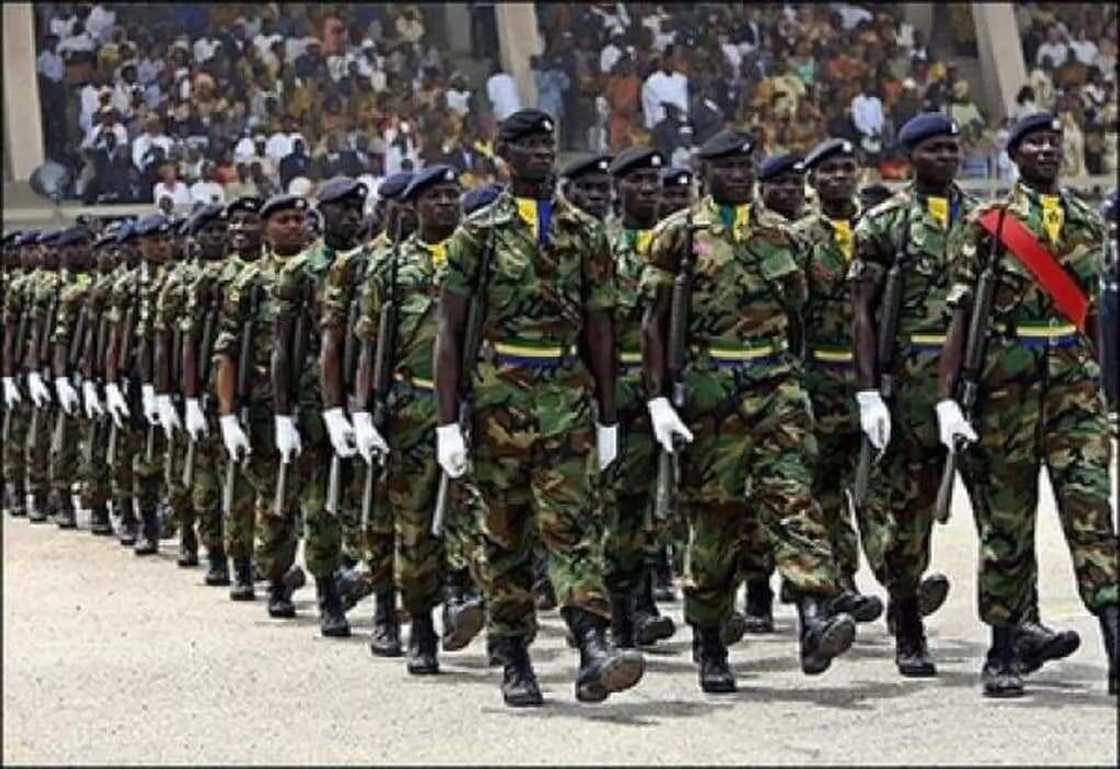
The armed forces can also be used to create awareness on the impact of logging on the environment. The army can also be in cooperated to be on the watch out for any forms of logging-related trades. Rural-urban migration is also a major affecting the country. A reasonable number of people have migrated to the urban areas causing congestion. Slums have also developed due to these overcrowding problem.
Overcrowding has also resulted to a strain on the available infrastructure. Another problem that citizens in Ghana face is lack of education and sustainability. Majority of the people do not have access to education and therefore cannot better their lives hence they still languish in poverty.
Note that the answers have to be detailed for them to be satisfying. To be prepared is half the success. Give it your all.
Source: YEN.com.gh


